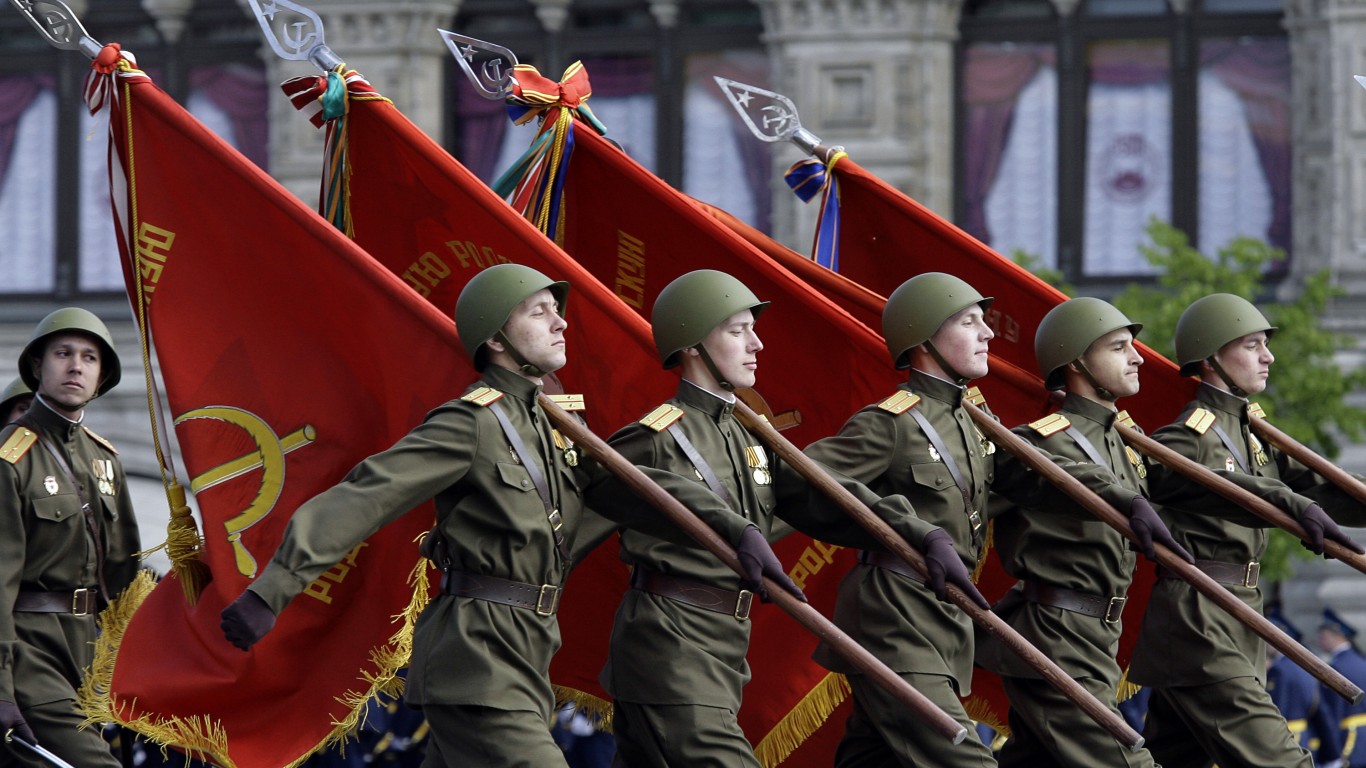
In what could prove to be the largest military conflict in Europe since World War II, Russia has launched what has been described as a full-scale invasion of its neighbor, Ukraine. Though Western governments, including the United States, have provided Ukraine with defensive weapons in anticipation of the conflict, the former Soviet republic and aspiring NATO ally remains militarily outmatched by Russia.
Russia, one of the world’s only military superpowers, has nearly 1.5 million armed forces personnel, according to estimates reported by the World Bank. Meanwhile, Ukrainian armed forces total just 311,000. Additionally, Russian military spending topped $61.7 billion in 2020, compared to Ukraine’s $5.9 billion.
While Russia’s military is one of the largest in the world – ranking among the top five countries – it is considerably smaller than that of a few other nations, including one of its neighbors.
Using armed forces personnel data from the World Bank, 24/7 Wall St. identified the countries with the world’s largest militaries. Personnel counts are for 2019 and include active-duty military personnel as well as paramilitary personnel, the most recent year of available data. Only paramilitary personnel whose training, organization, and equipment suggest they could be used alongside – or in lieu of – a more traditional military were included. Their inclusion means that personnel estimates may differ from other published estimates.
We also considered military spending, both in U.S. dollars and as a share of GDP. Though many of the countries with the largest militaries also tend to invest more than average on their armed forces, no country has a larger defense budget than the United States. The U.S. spent $778.2 billion on its military in 2020, triple the amount spent by China, the country with the second largest military budget, and more than 12 times Russia’s spending. Here is a look at the companies profiting the most from war.
Click here to see the countries with the largest militaries.
Click here to read our detailed methodology.

30. Bangladesh
> Military and paramilitary personnel: 227,000 (0.3% of labor force)
> Military spending, 2020: $4.6 billion (1.3% of GDP)
>Total population: 164,689,383
[in-text-ad]
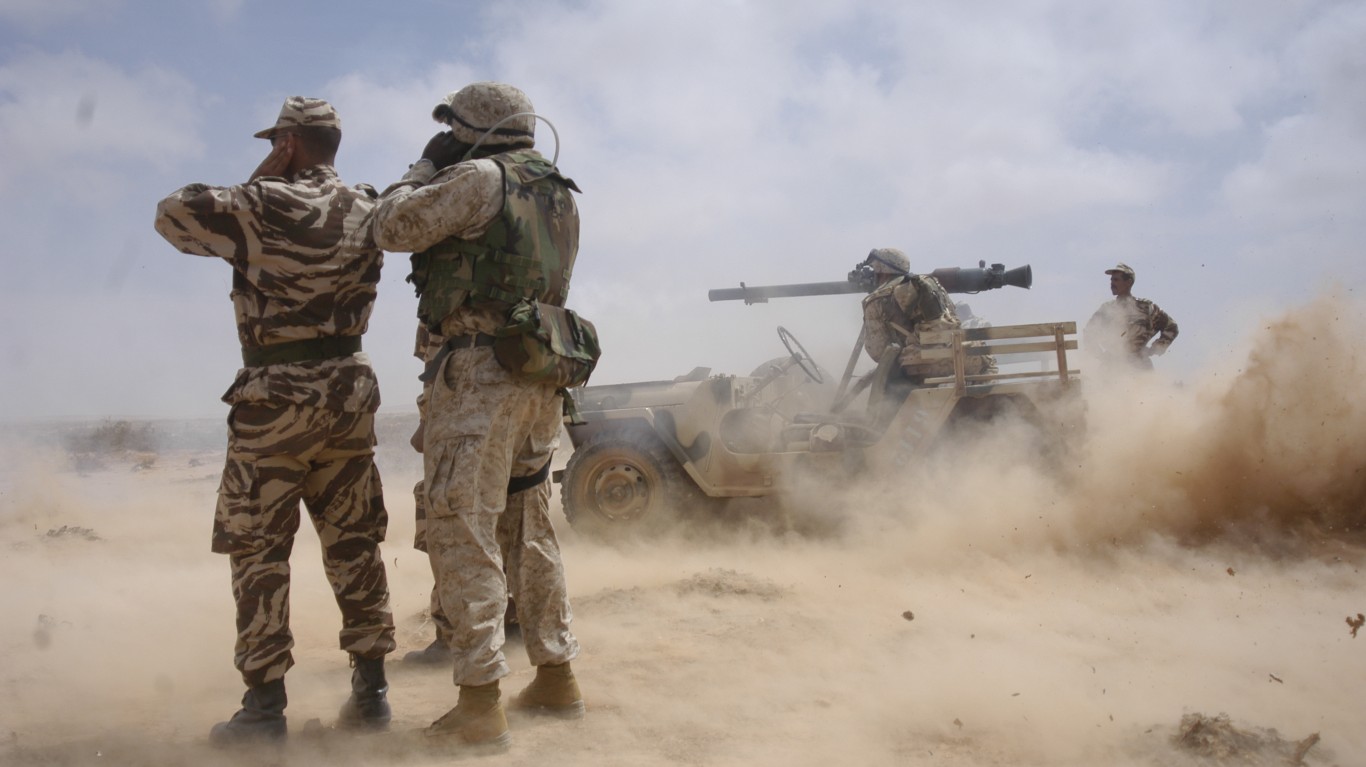
29. Morocco
> Military and paramilitary personnel: 246,000 (2.0% of labor force)
> Military spending, 2020: $4.8 billion (4.3% of GDP)
>Total population: 36,910,558

28. Saudi Arabia
> Military and paramilitary personnel: 252,000 (1.7% of labor force)
> Military spending, 2020: $57.5 billion (8.4% of GDP)
>Total population: 34,813,867
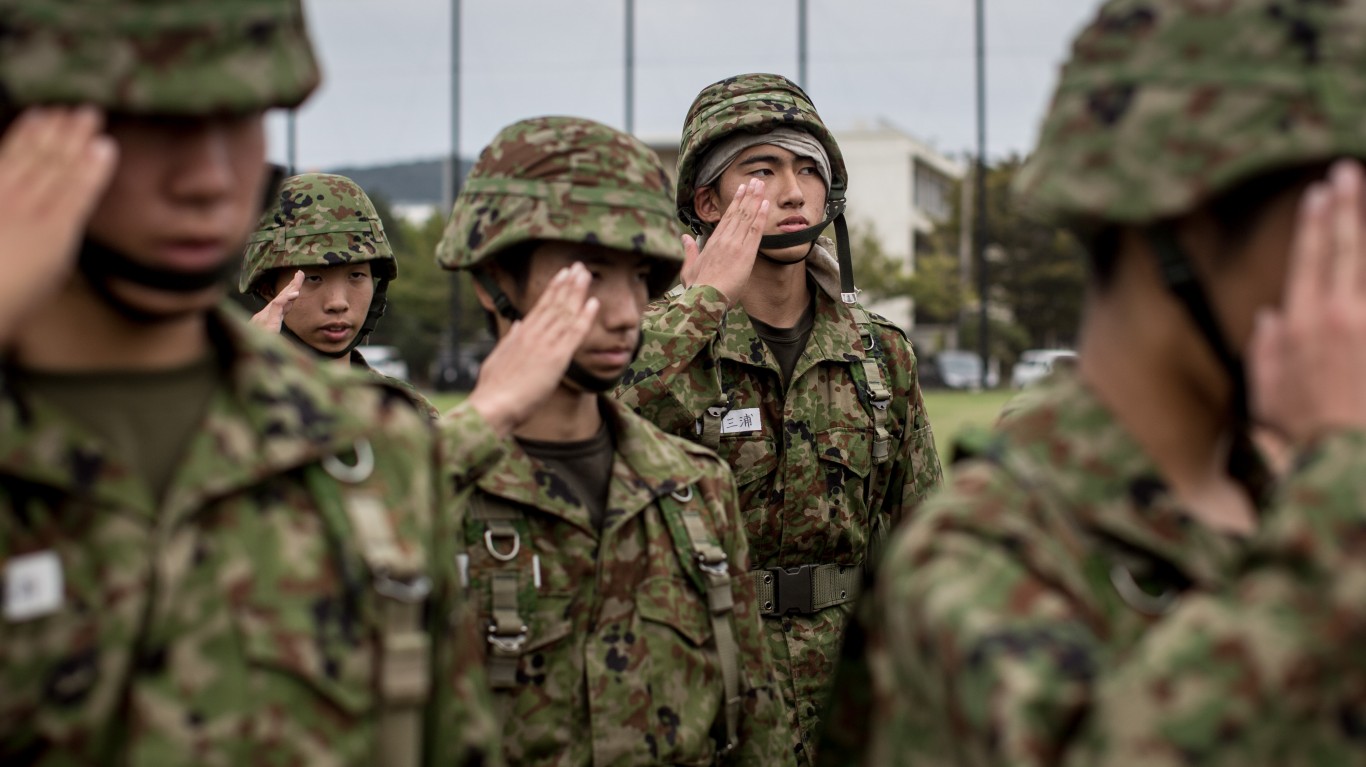
27. Japan
> Military and paramilitary personnel: 261,000 (0.4% of labor force)
> Military spending, 2020: $49.1 billion (1.0% of GDP)
>Total population: 125,836,021
[in-text-ad-2]
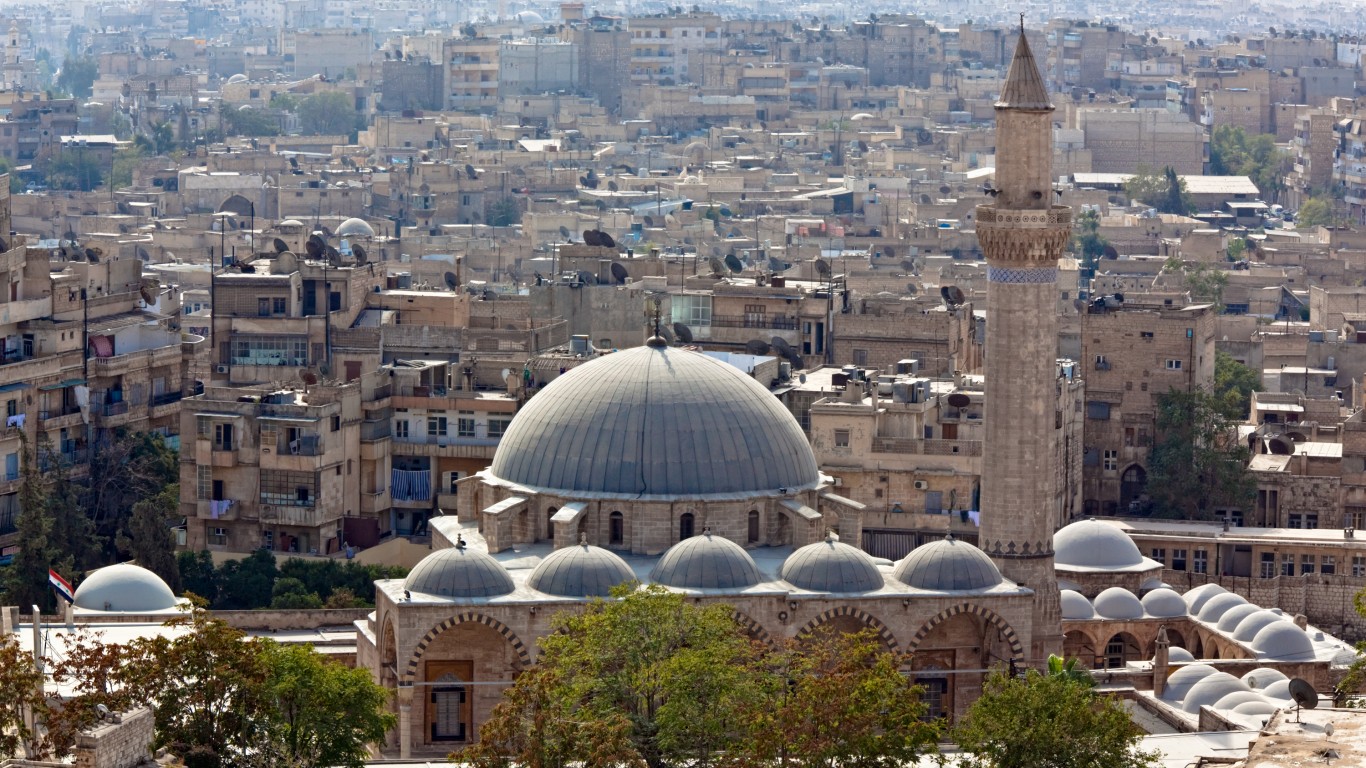
26. Syrian Arab Republic
> Military and paramilitary personnel: 269,000 (5.2% of labor force)
> Military spending, 2020: N/A
>Total population: 17,500,657
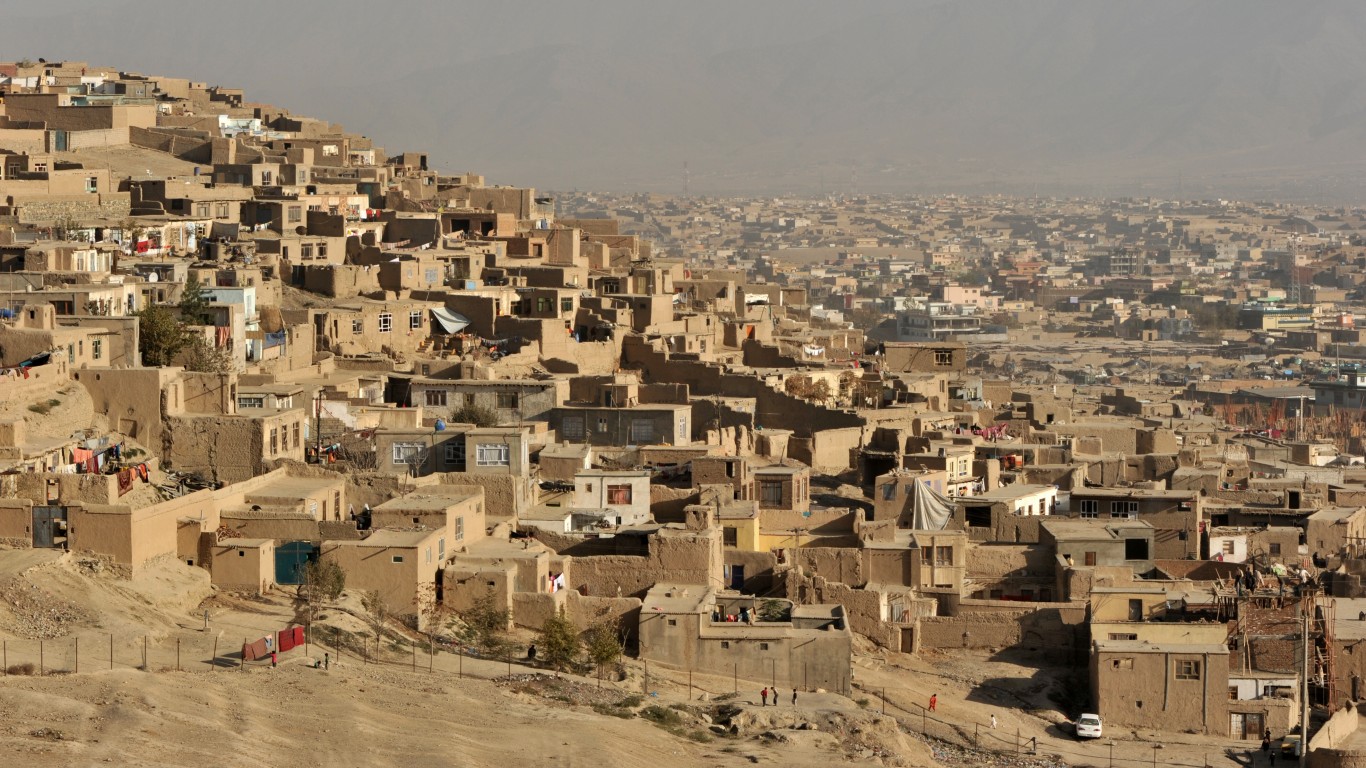
25. Afghanistan
> Military and paramilitary personnel: 278,000 (2.7% of labor force)
> Military spending, 2020: $279.6 million (1.4% of GDP)
>Total population: 38,928,341
[in-text-ad]
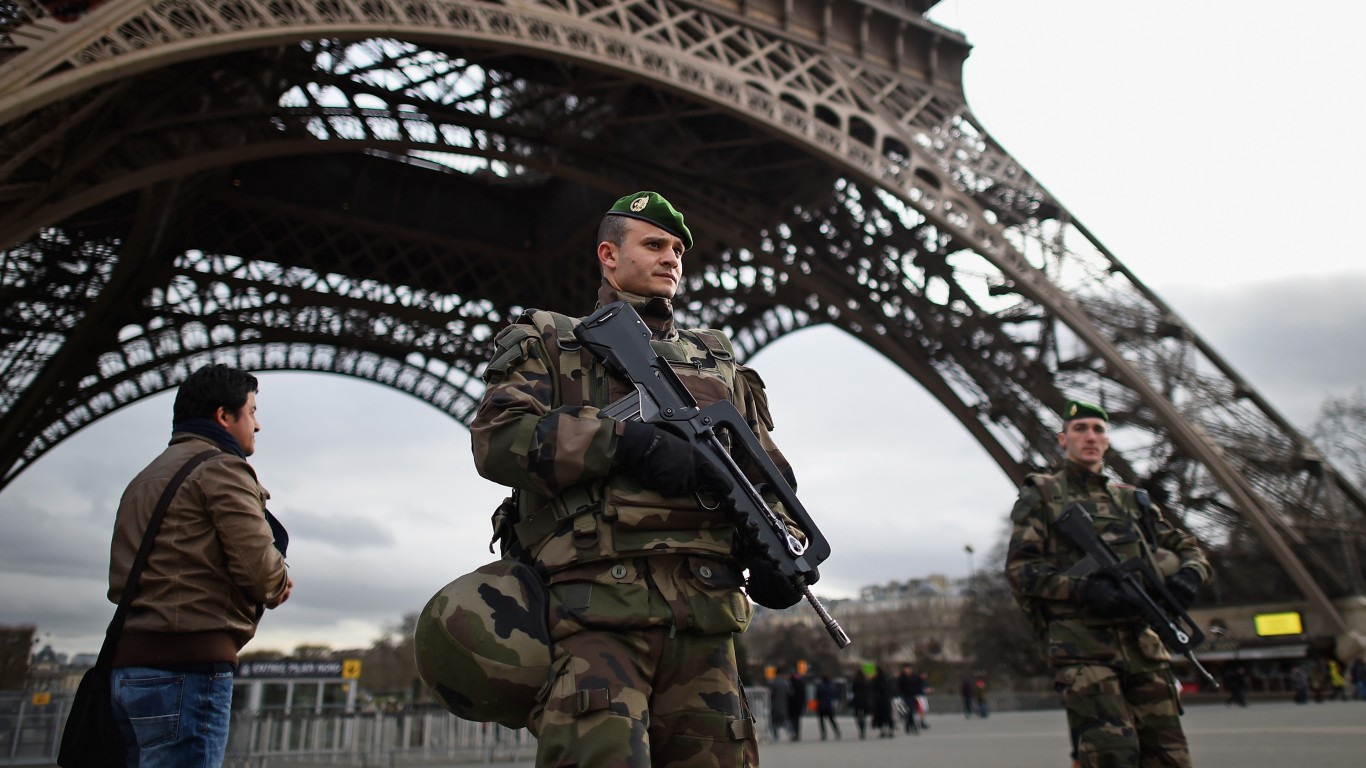
24. France
> Military and paramilitary personnel: 304,000 (1.0% of labor force)
> Military spending, 2020: $52.7 billion (2.1% of GDP)
>Total population: 67,391,582
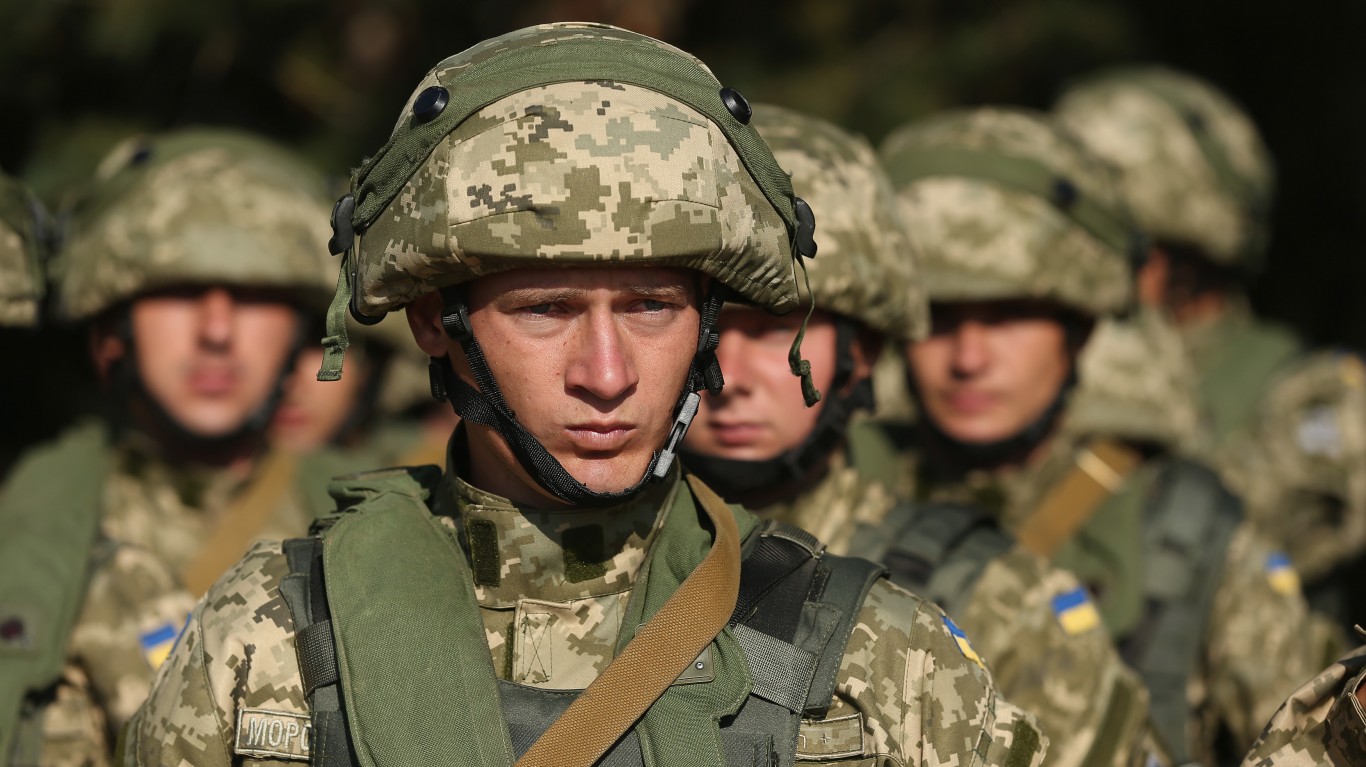
23. Ukraine
> Military and paramilitary personnel: 311,000 (1.5% of labor force)
> Military spending, 2020: $5.9 billion (4.1% of GDP)
>Total population: 44,134,693
22. Sri Lanka
> Military and paramilitary personnel: 317,000 (3.7% of labor force)
> Military spending, 2020: $1.6 billion (1.9% of GDP)
>Total population: 21,919,000
[in-text-ad-2]
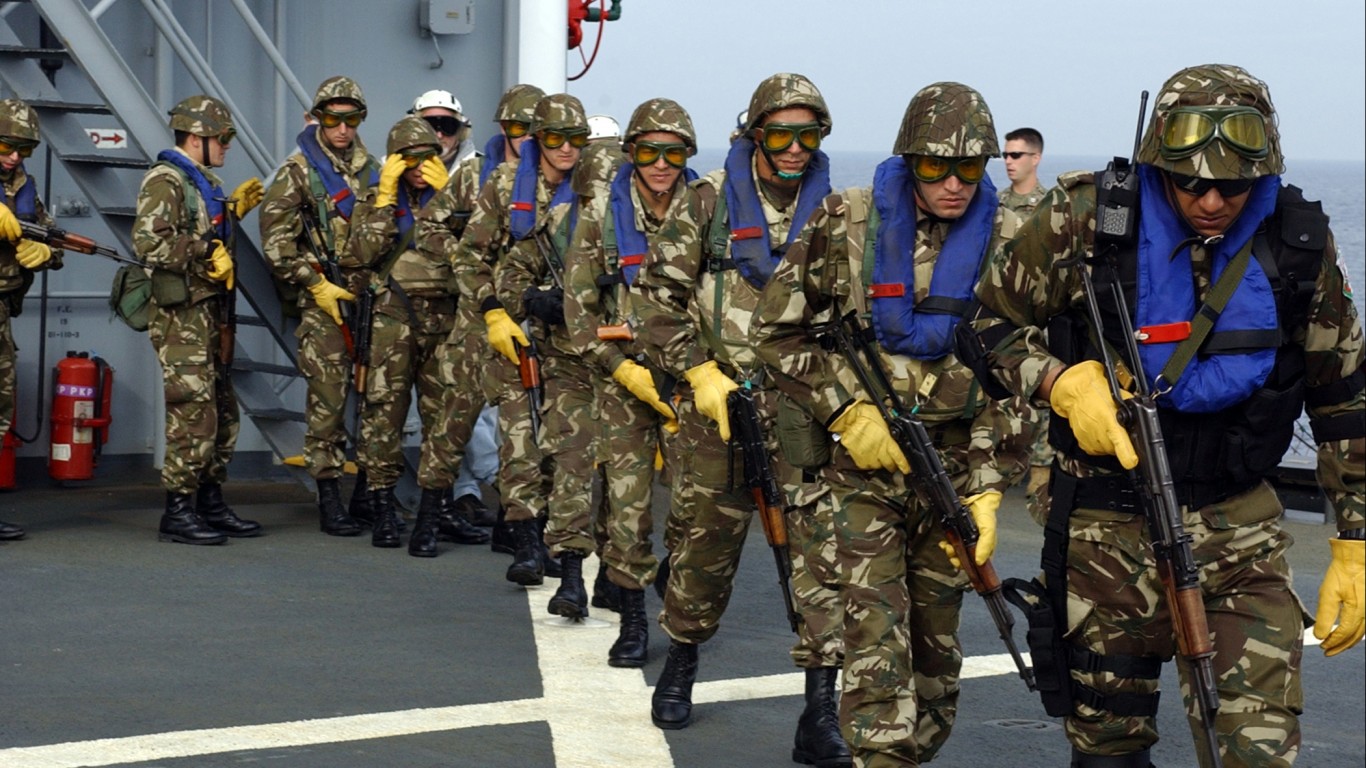
21. Algeria
> Military and paramilitary personnel: 317,000 (2.5% of labor force)
> Military spending, 2020: $9.7 billion (6.7% of GDP)
>Total population: 43,851,043
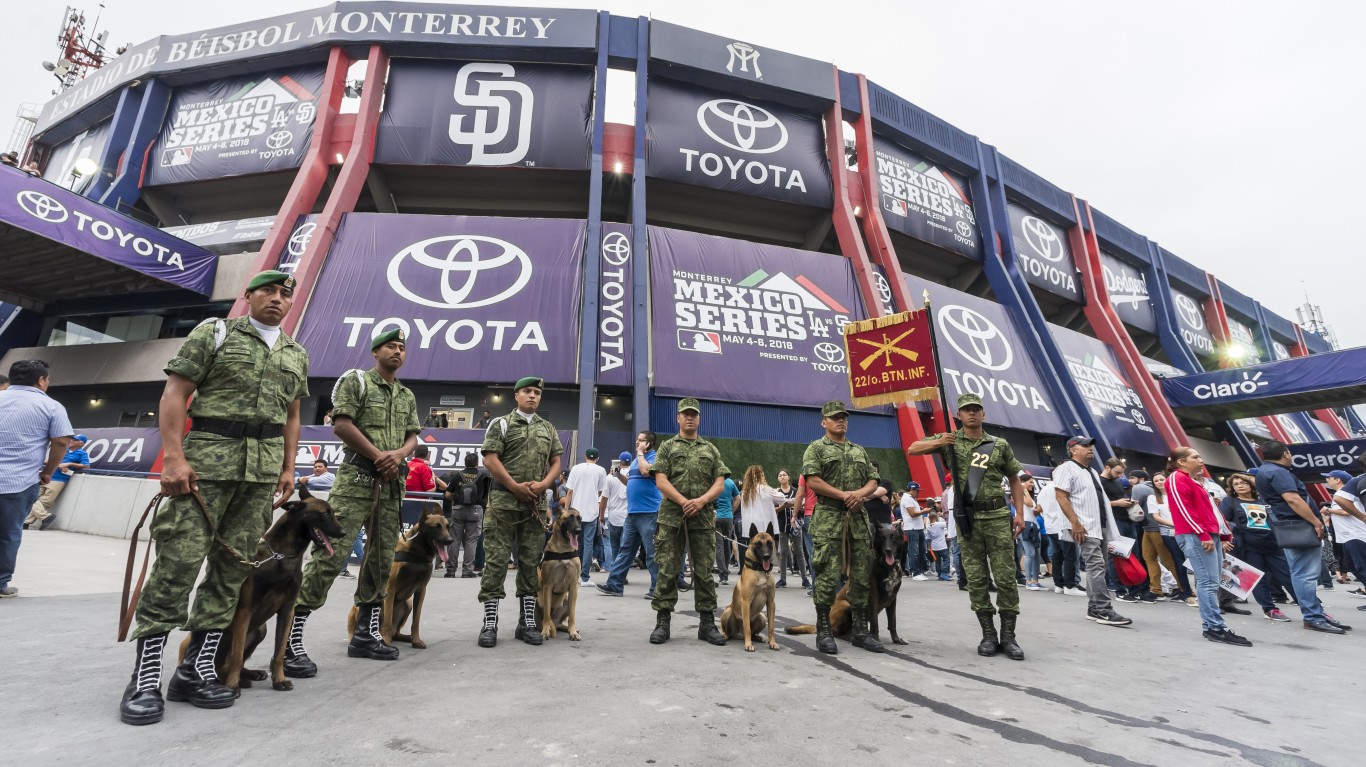
20. Mexico
> Military and paramilitary personnel: 328,000 (0.6% of labor force)
> Military spending, 2020: $6.1 billion (0.6% of GDP)
>Total population: 128,932,753
[in-text-ad]
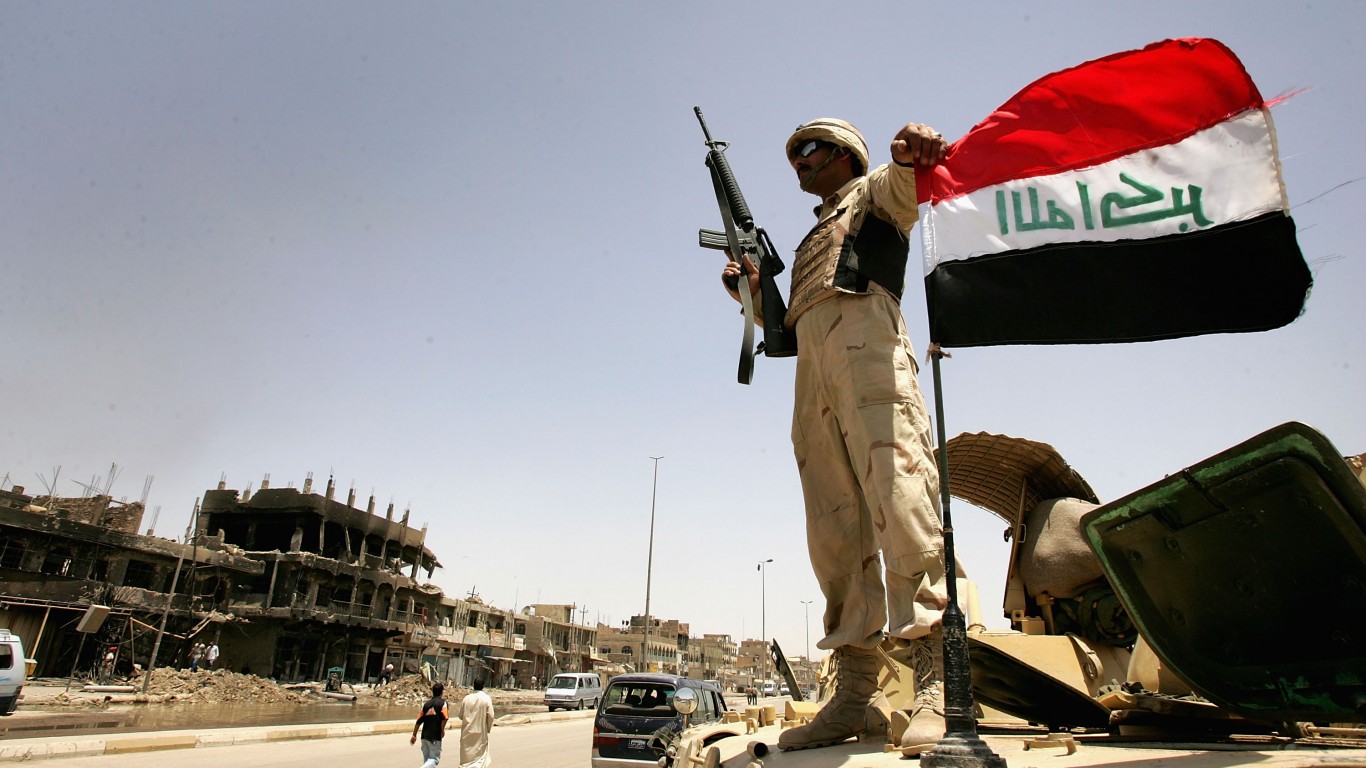
19. Iraq
> Military and paramilitary personnel: 341,000 (3.3% of labor force)
> Military spending, 2020: $7.0 billion (4.1% of GDP)
>Total population: 40,222,503
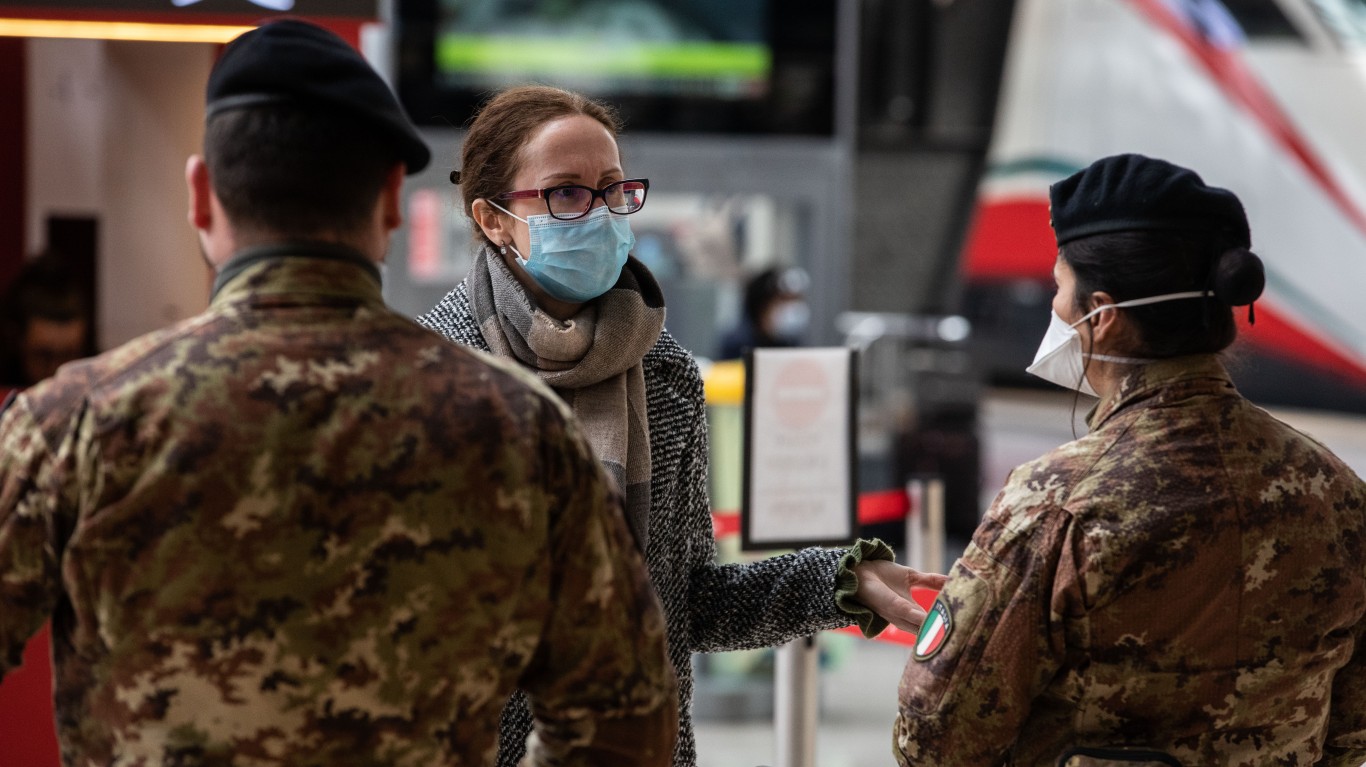
18. Italy
> Military and paramilitary personnel: 342,000 (1.3% of labor force)
> Military spending, 2020: $28.9 billion (1.6% of GDP)
>Total population: 59,554,023
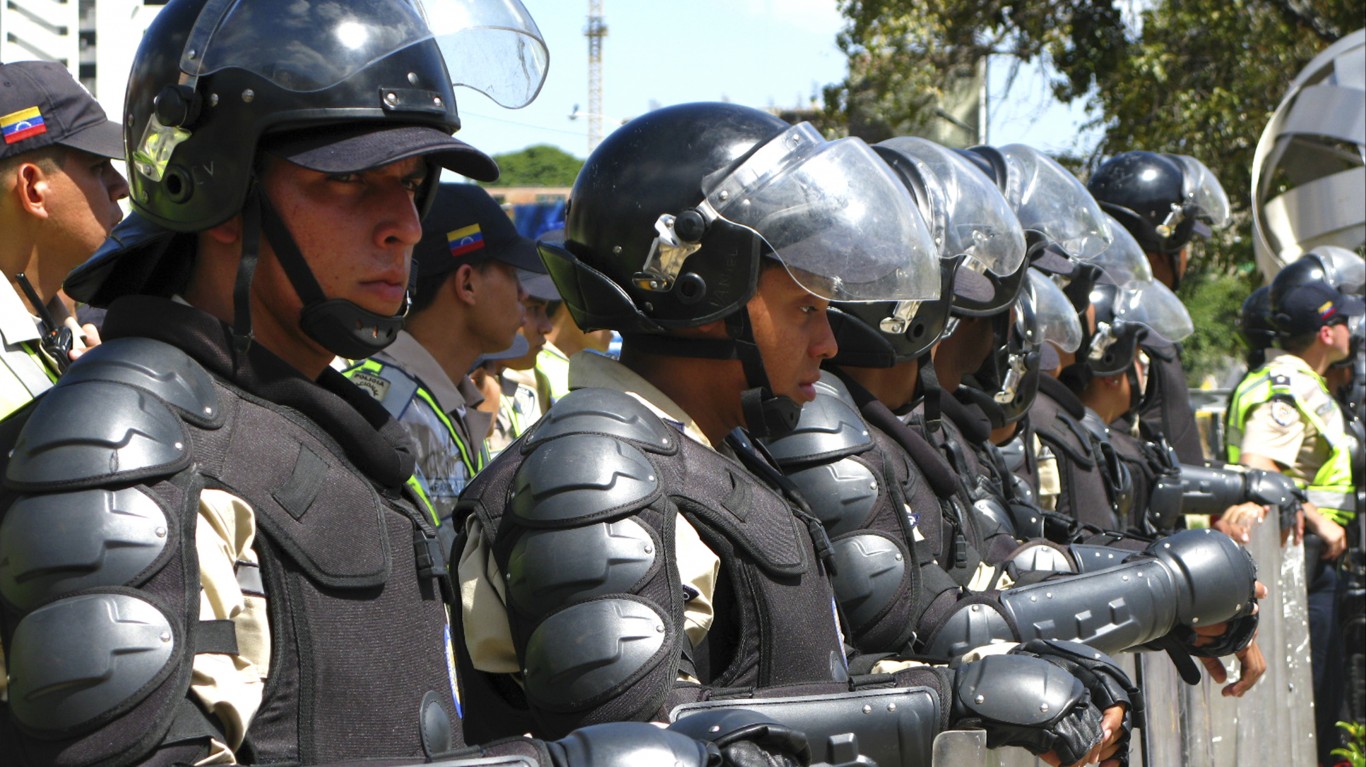
17. Venezuela
> Military and paramilitary personnel: 343,000 (3.1% of labor force)
> Military spending, 2020: N/A
>Total population: 28,435,943
[in-text-ad-2]
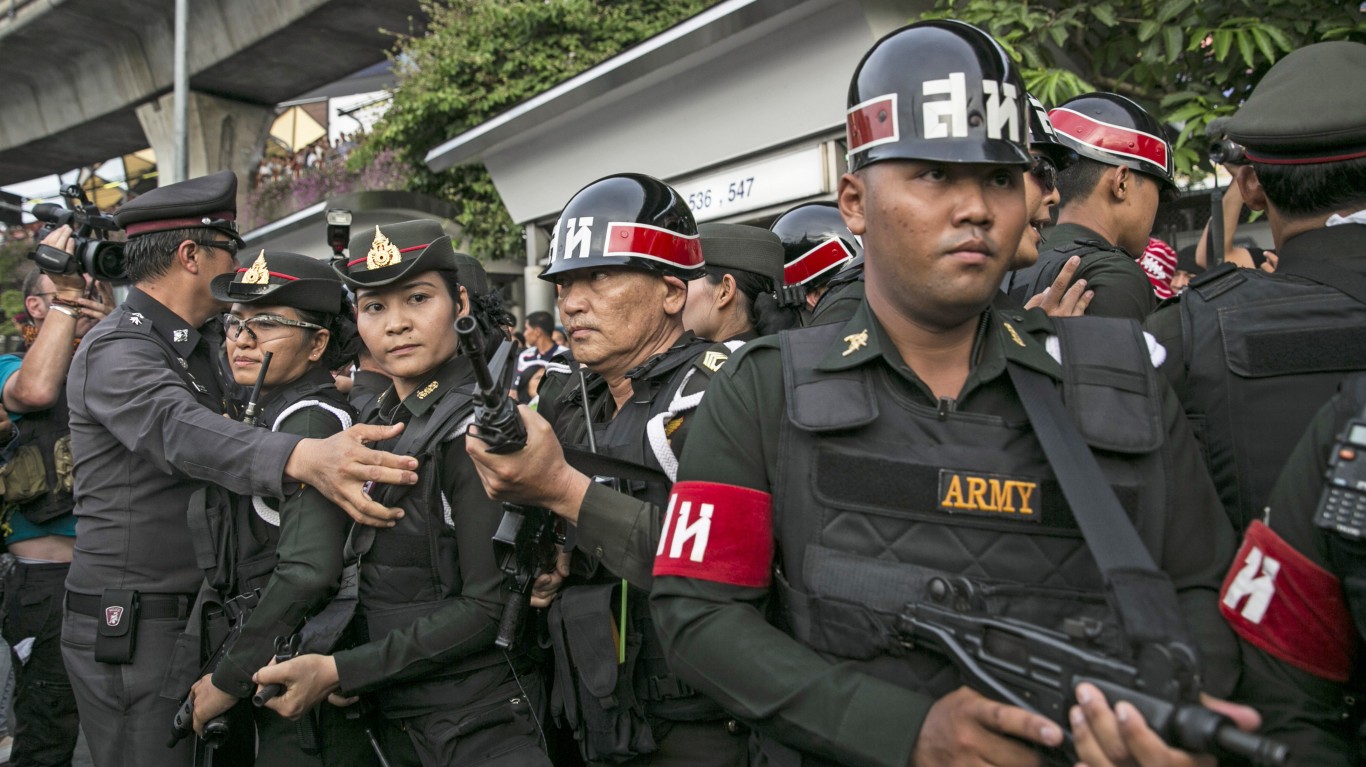
16. Thailand
> Military and paramilitary personnel: 455,000 (1.2% of labor force)
> Military spending, 2020: $7.3 billion (1.5% of GDP)
>Total population: 69,799,978
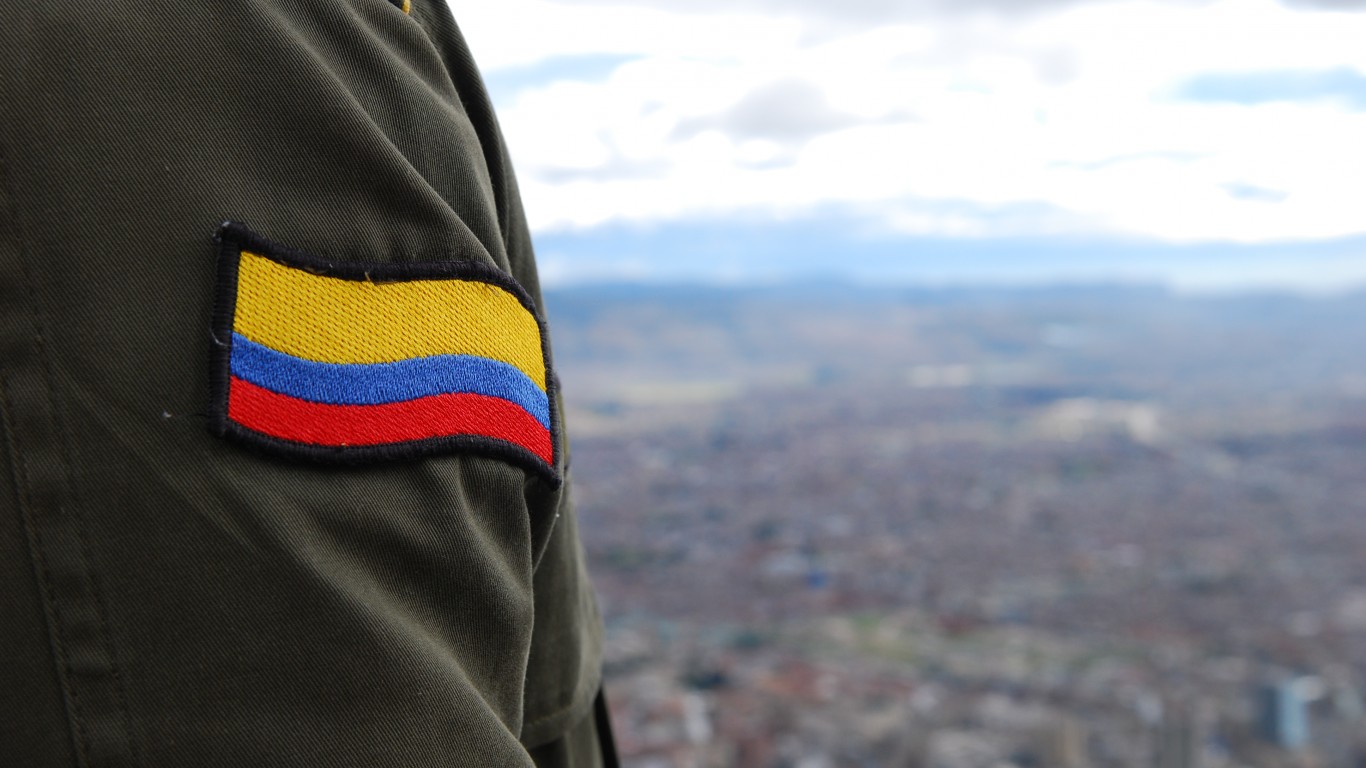
15. Colombia
> Military and paramilitary personnel: 481,000 (1.8% of labor force)
> Military spending, 2020: $9.2 billion (3.4% of GDP)
>Total population: 50,882,884
[in-text-ad]
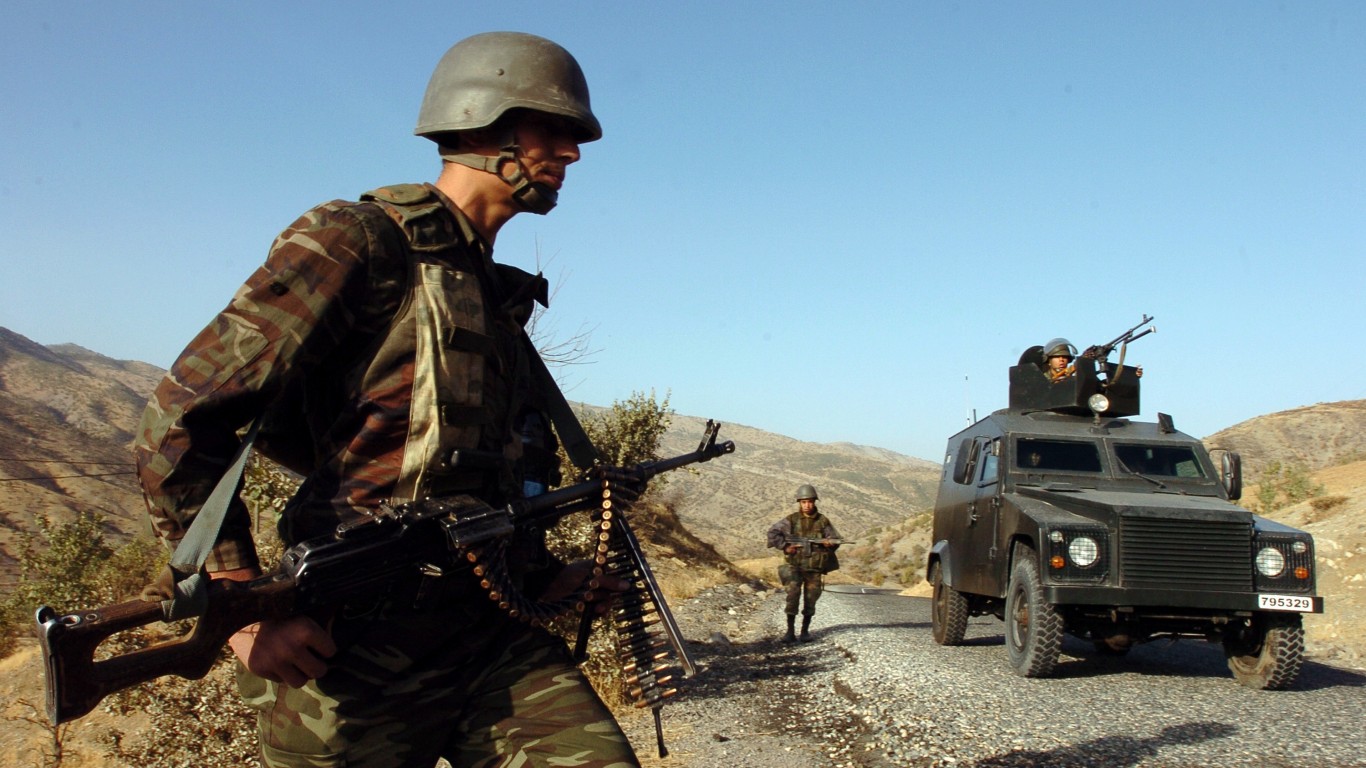
14. Turkey
> Military and paramilitary personnel: 512,000 (1.5% of labor force)
> Military spending, 2020: $17.7 billion (2.8% of GDP)
>Total population: 84,339,067
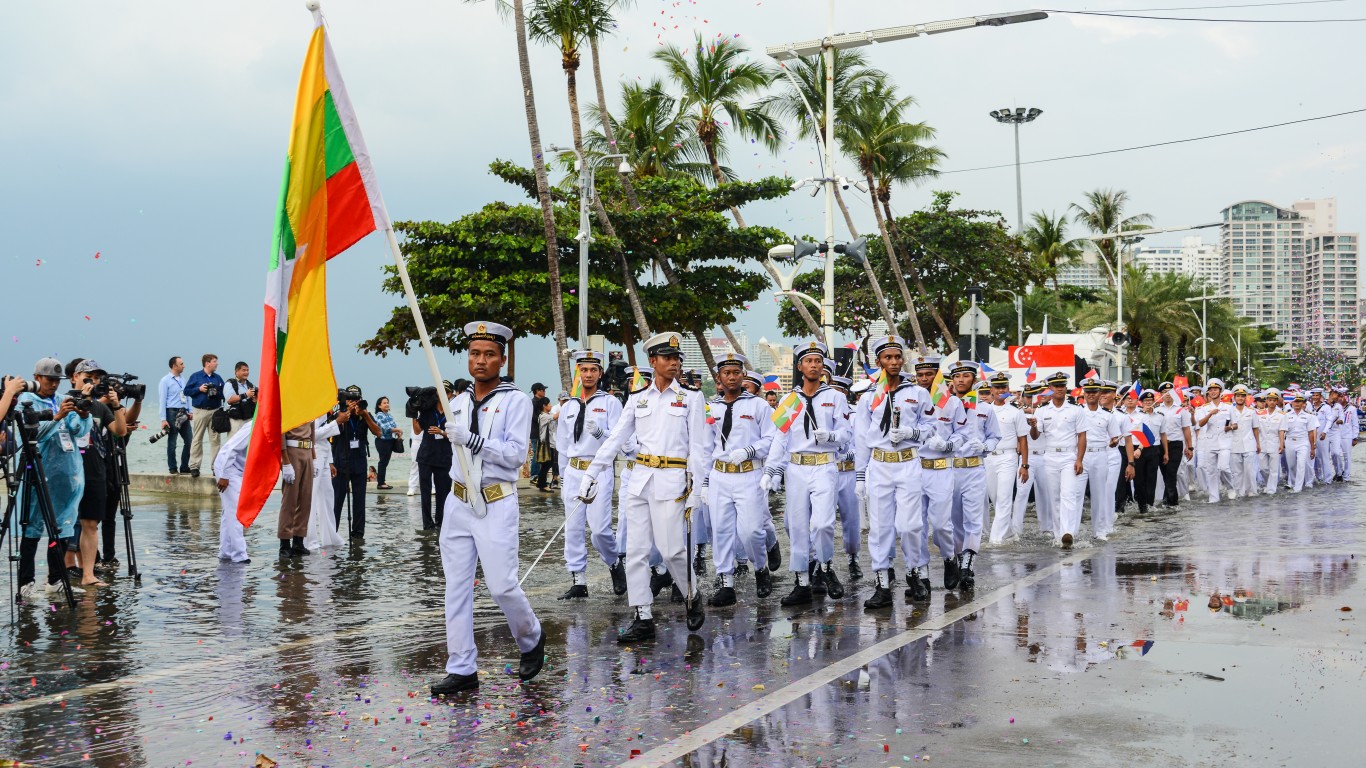
13. Myanmar
> Military and paramilitary personnel: 513,000 (2.2% of labor force)
> Military spending, 2020: $2.4 billion (2.9% of GDP)
>Total population: 54,409,794

12. Vietnam
> Military and paramilitary personnel: 522,000 (0.9% of labor force)
> Military spending, 2020: N/A
>Total population: 97,338,583
[in-text-ad-2]
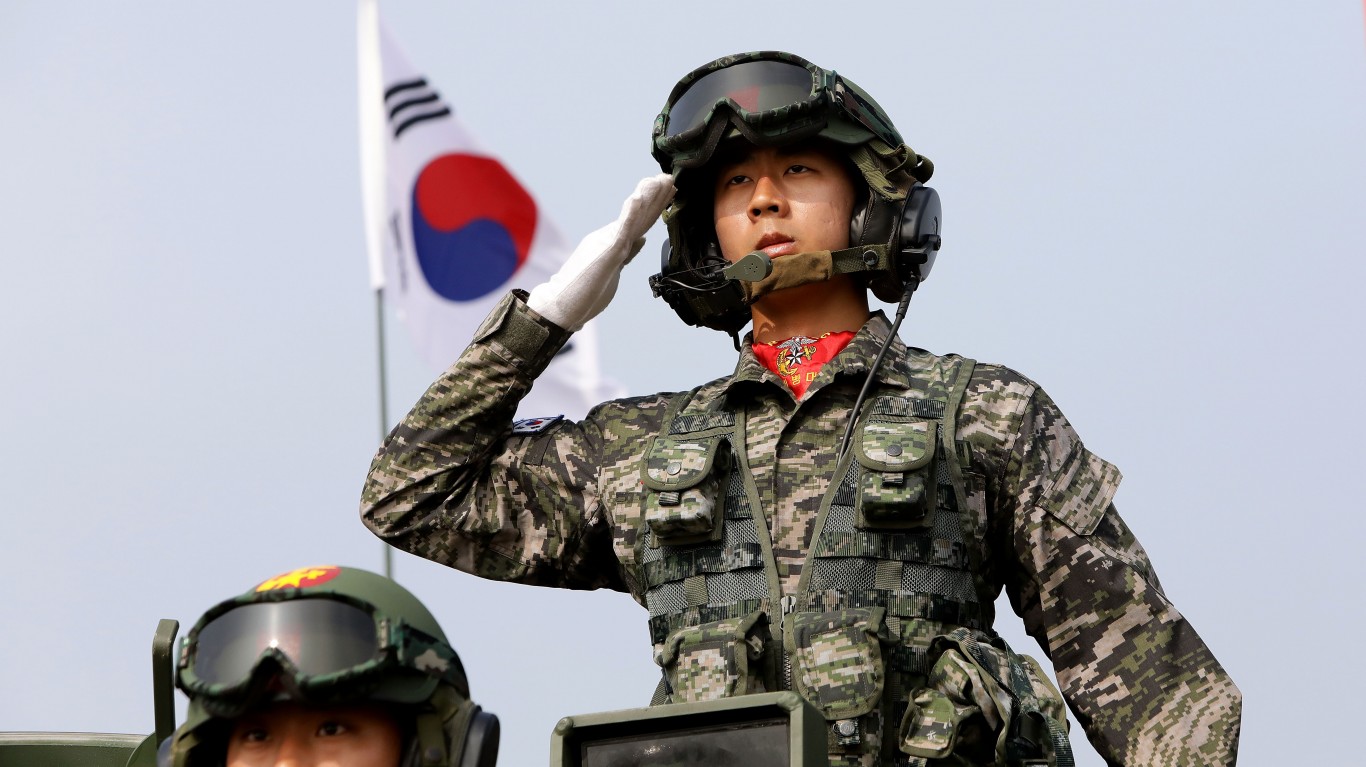
11. South Korea
> Military and paramilitary personnel: 613,000 (2.1% of labor force)
> Military spending, 2020: $45.7 billion (2.8% of GDP)
>Total population: 51,780,579
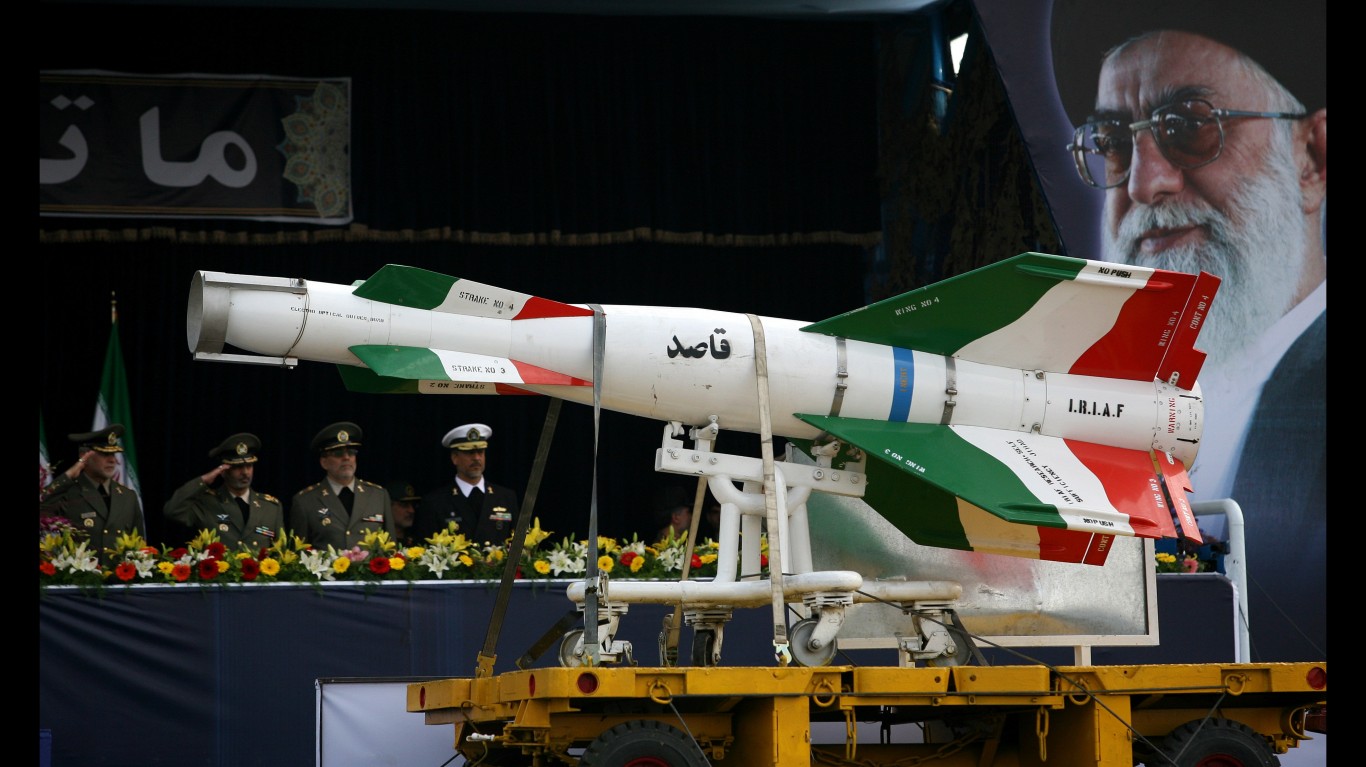
10. Iran
> Military and paramilitary personnel: 650,000 (2.4% of labor force)
> Military spending, 2020: $15.8 billion (2.2% of GDP)
>Total population: 83,992,953
[in-text-ad]
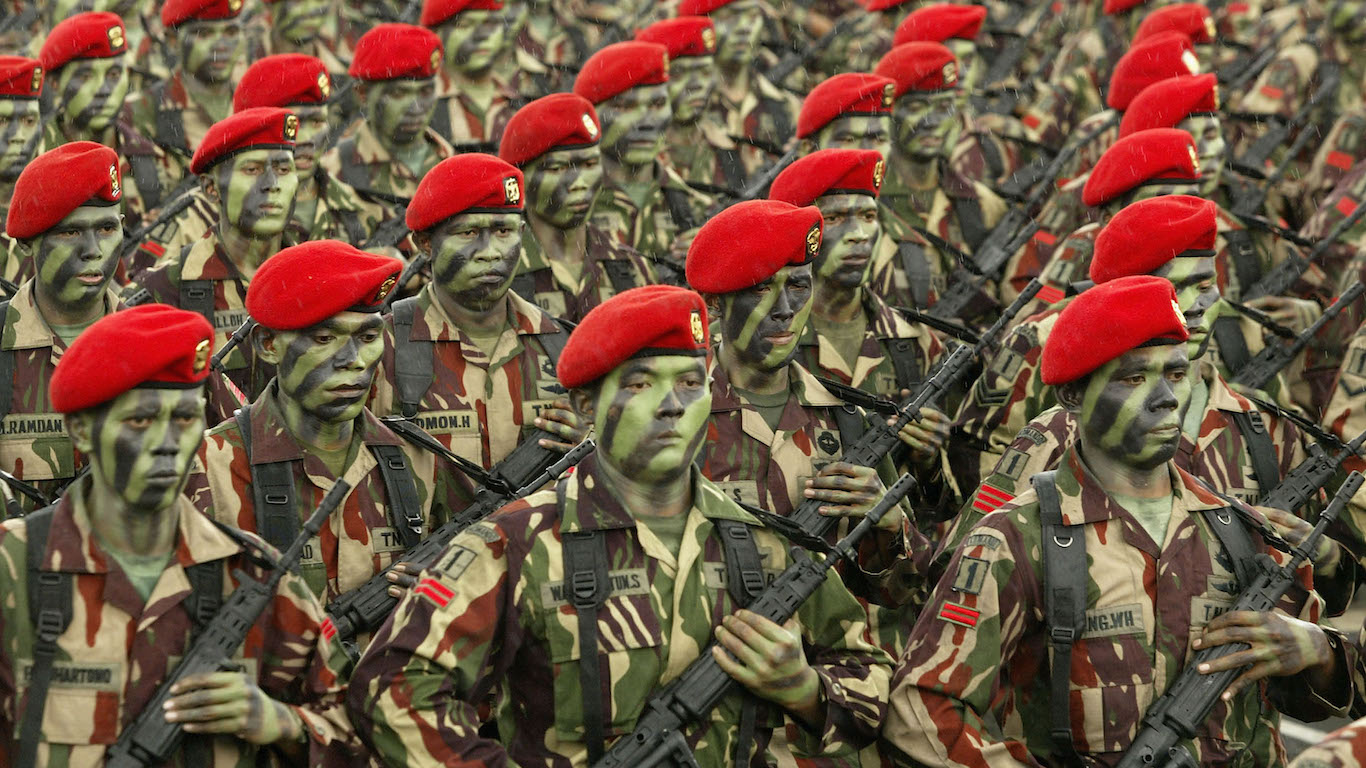
9. Indonesia
> Military and paramilitary personnel: 676,000 (0.5% of labor force)
> Military spending, 2020: $9.4 billion (0.9% of GDP)
>Total population: 273,523,621
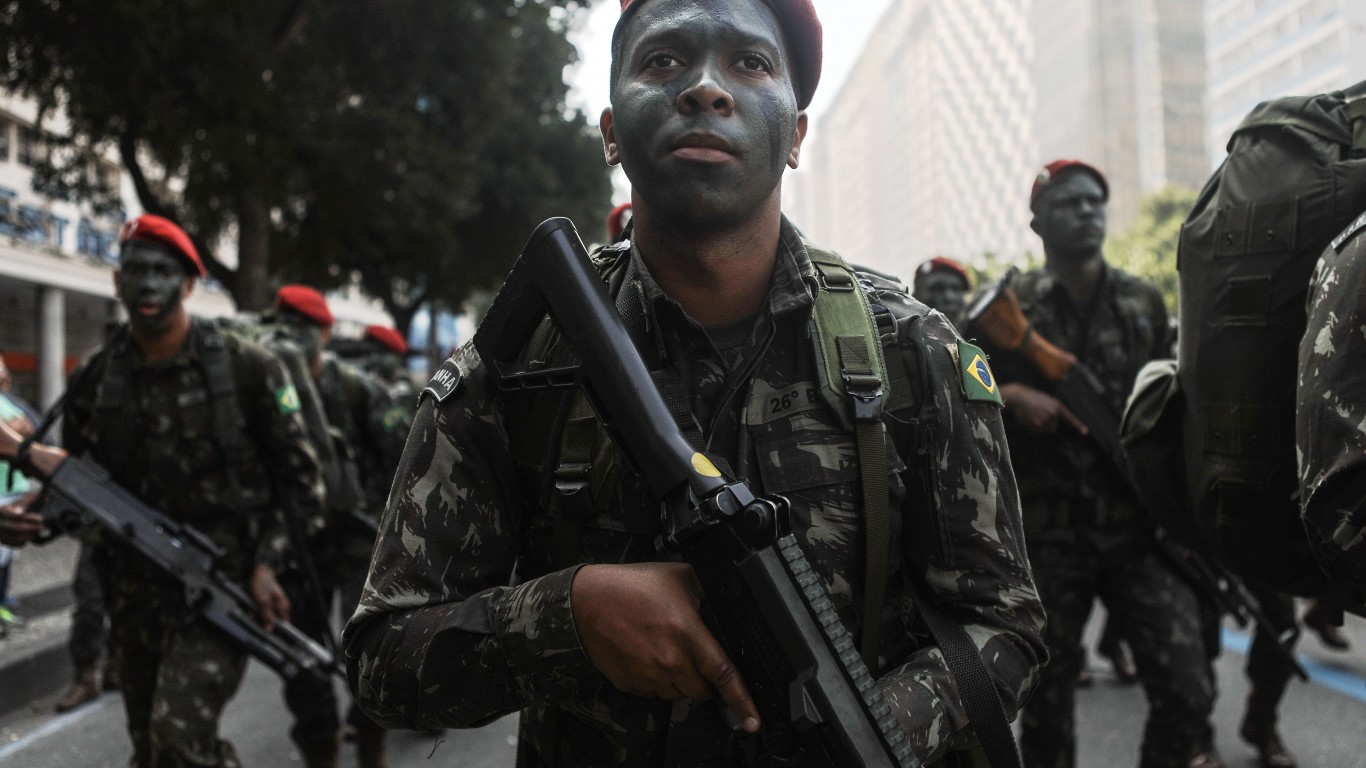
8. Brazil
> Military and paramilitary personnel: 762,000 (0.7% of labor force)
> Military spending, 2020: $19.7 billion (1.4% of GDP)
>Total population: 212,559,409
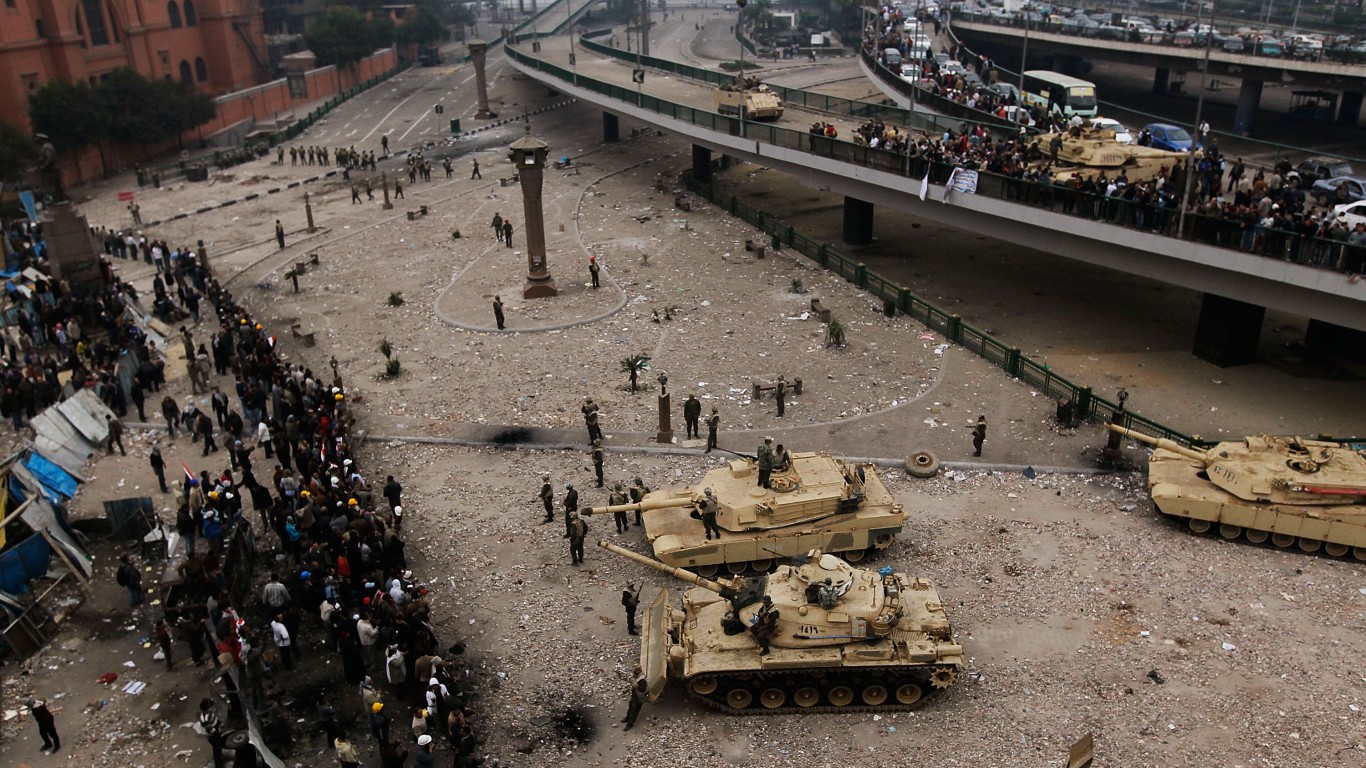
7. Egypt
> Military and paramilitary personnel: 836,000 (3.0% of labor force)
> Military spending, 2020: $4.5 billion (1.2% of GDP)
>Total population: 102,334,403
[in-text-ad-2]
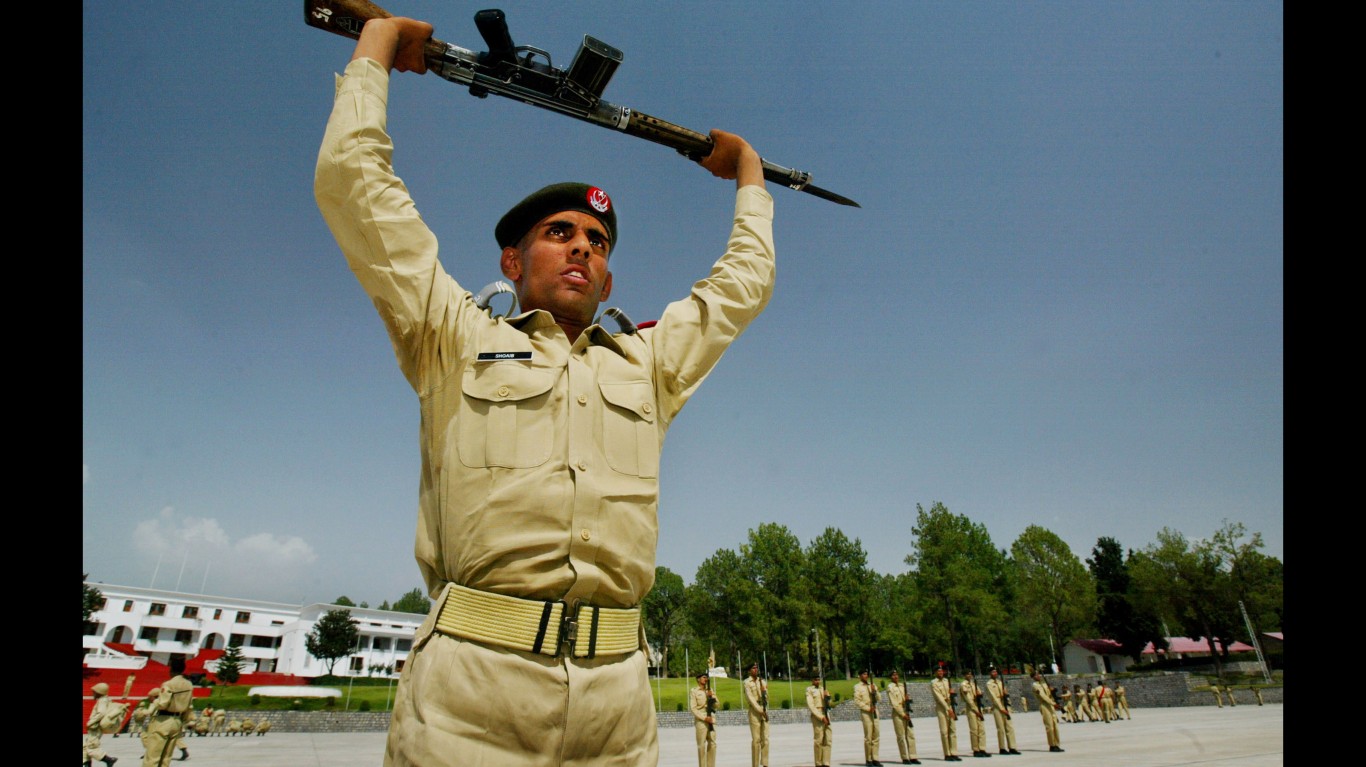
6. Pakistan
> Military and paramilitary personnel: 943,000 (1.3% of labor force)
> Military spending, 2020: $10.4 billion (4.0% of GDP)
>Total population: 220,892,331

5. United States
> Military and paramilitary personnel: 1,388,000 (0.8% of labor force)
> Military spending, 2020: $778.2 billion (3.7% of GDP)
>Total population: 329,484,123
[in-text-ad]
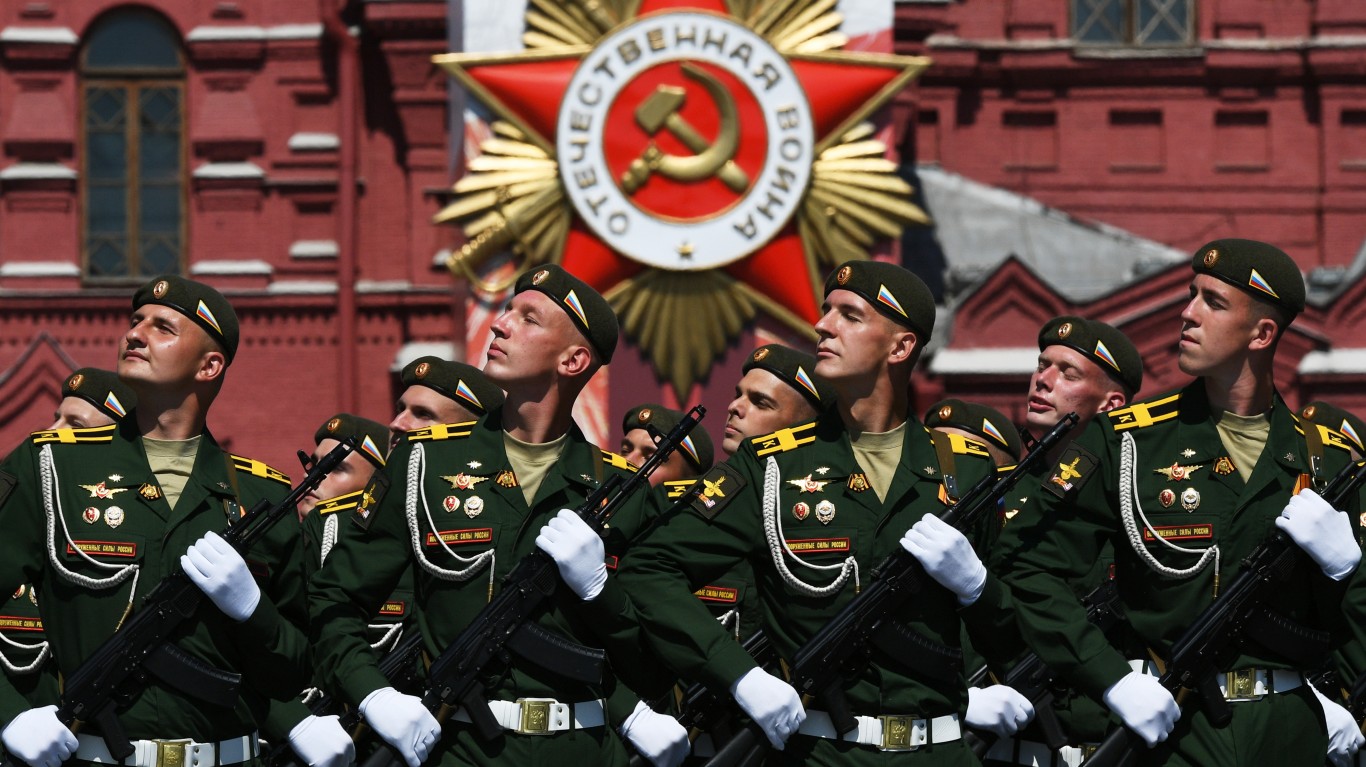
4. Russian Federation
> Military and paramilitary personnel: 1,454,000 (2.0% of labor force)
> Military spending, 2020: $61.7 billion (4.3% of GDP)
>Total population: 144,104,080
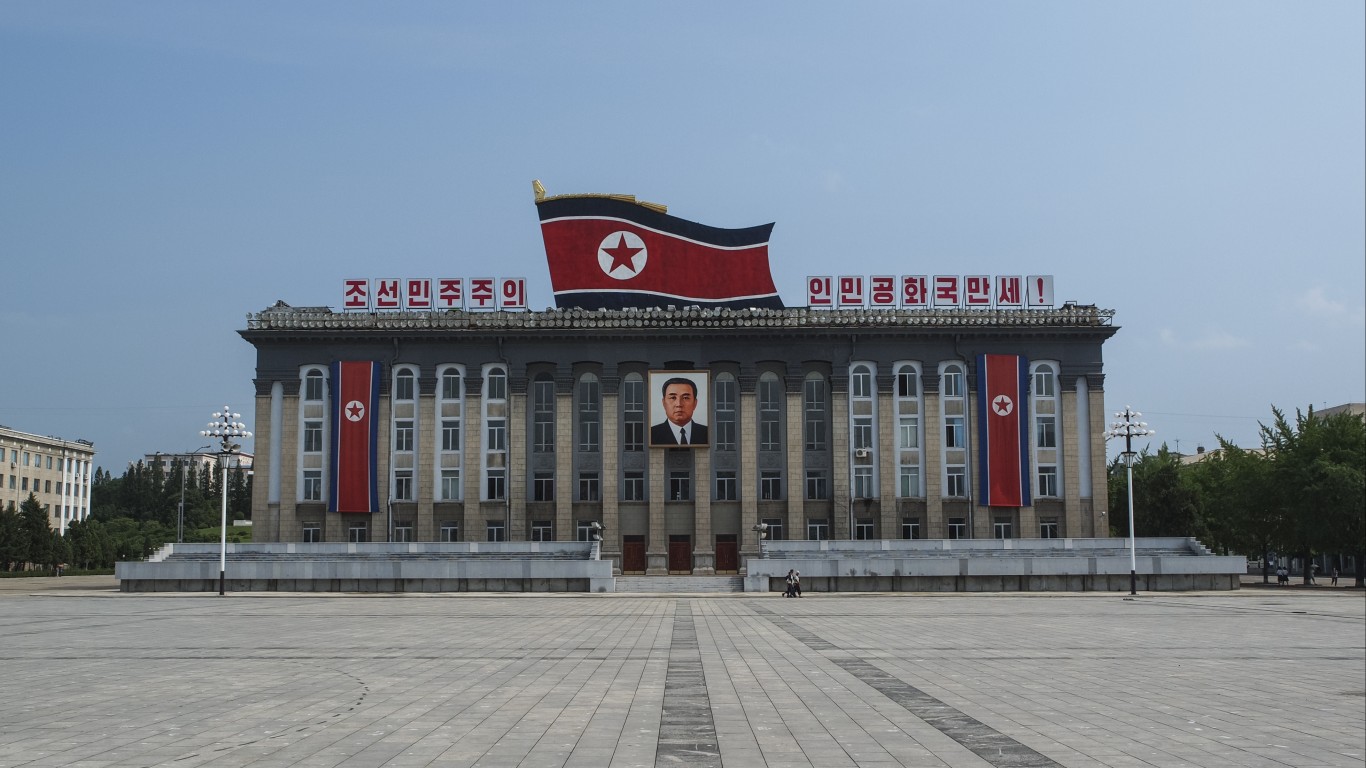
3. North Korea
> Military and paramilitary personnel: 1,469,000 (8.7% of labor force)
> Military spending, 2020: N/A
>Total population: 25,778,815
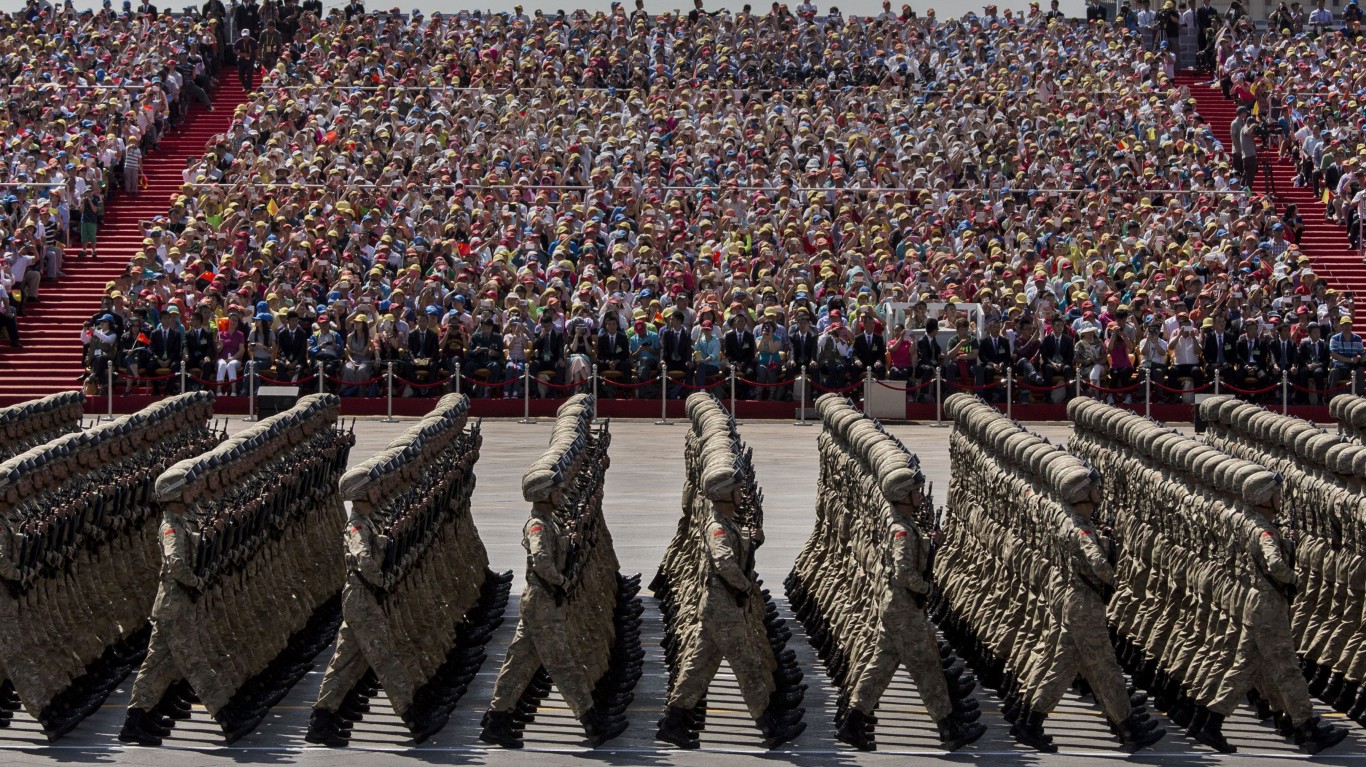
2. China
> Military and paramilitary personnel: 2,535,000 (0.3% of labor force)
> Military spending, 2020: $252.3 billion (1.7% of GDP)
>Total population: 1,410,929,362
[in-text-ad-2]

1. India
> Military and paramilitary personnel: 3,045,000 (0.6% of labor force)
> Military spending, 2020: $72.9 billion (2.9% of GDP)
>Total population: 1,380,004,385
Methodology
To determine the countries with the largest militaries, 24/7 Wall St. reviewed World Bank data on military personnel from 2019, the most recent year of available data. Personnel counts include active-duty military personnel as well as paramilitary personnel.
Annual military expenditure in current U.S. dollars in 2020 are from the Stockholm International Peace Research Institute. Military expenditure covers the expenditures on current military forces and activities, including salaries and benefits, operational expenses, arms and equipment purchases, military construction, research and development, central administration, command, and support. Supplemental data on military expenditure and military expenditure as a percentage of GDP, and military expenditure per capita also came from SIPRI. Population data for 2020 came from the World Bank.
100 Million Americans Are Missing This Crucial Retirement Tool
The thought of burdening your family with a financial disaster is most Americans’ nightmare. However, recent studies show that over 100 million Americans still don’t have proper life insurance in the event they pass away.
Life insurance can bring peace of mind – ensuring your loved ones are safeguarded against unforeseen expenses and debts. With premiums often lower than expected and a variety of plans tailored to different life stages and health conditions, securing a policy is more accessible than ever.
A quick, no-obligation quote can provide valuable insight into what’s available and what might best suit your family’s needs. Life insurance is a simple step you can take today to help secure peace of mind for your loved ones tomorrow.
Click here to learn how to get a quote in just a few minutes.
Thank you for reading! Have some feedback for us?
Contact the 24/7 Wall St. editorial team.
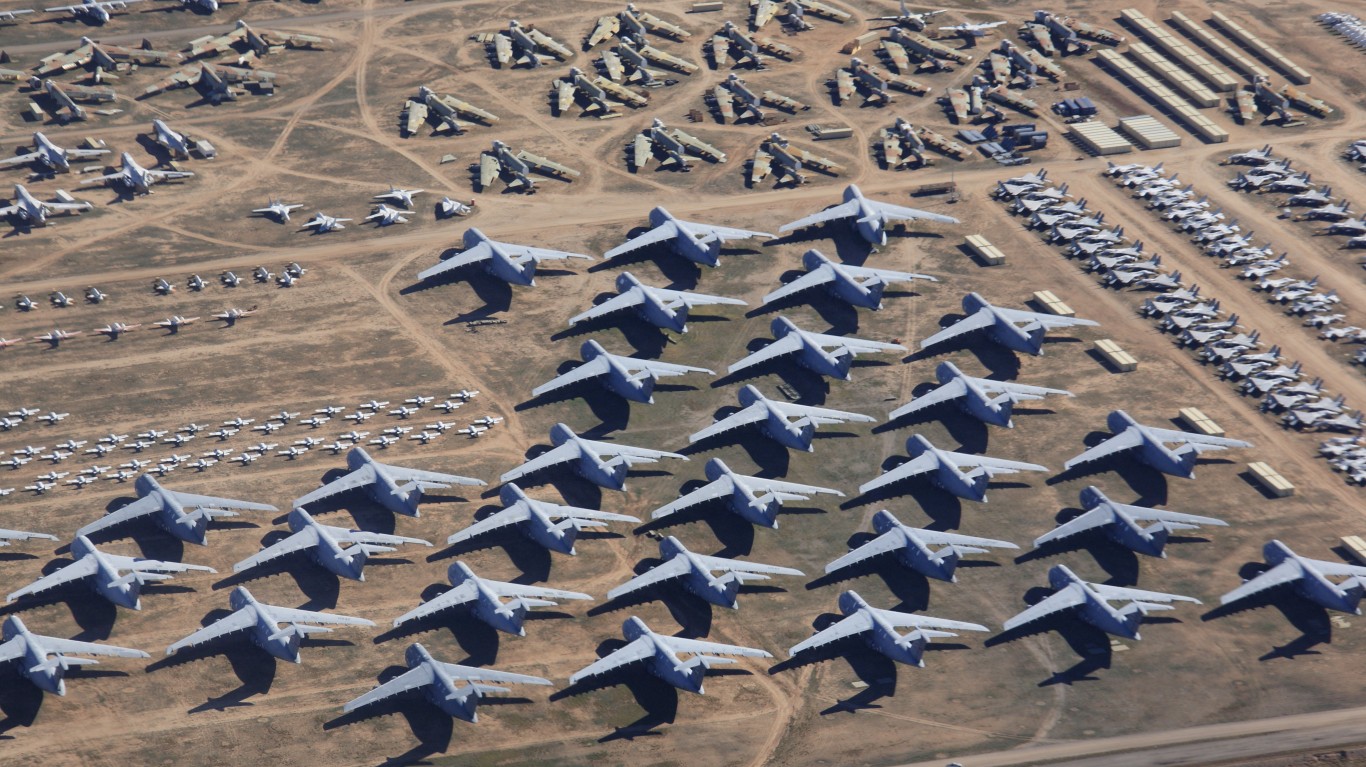 24/7 Wall St.
24/7 Wall St.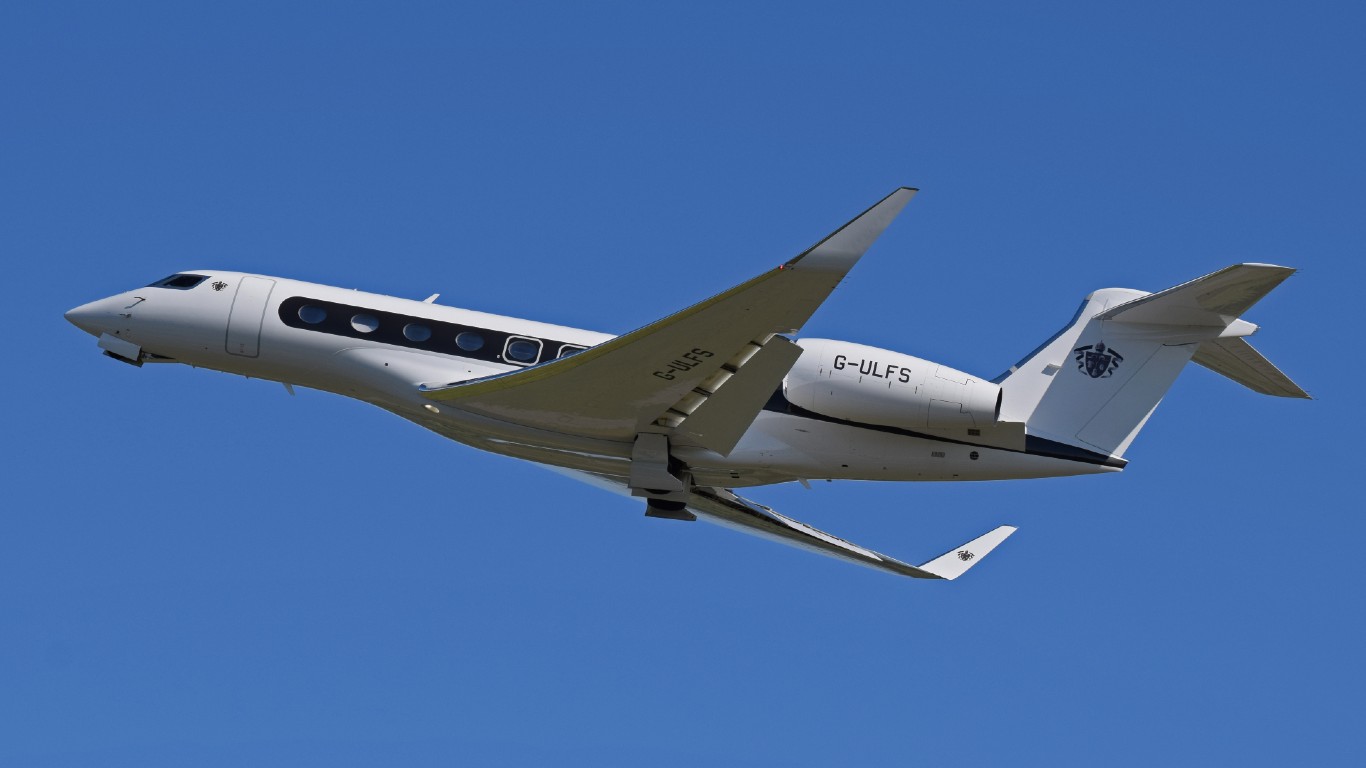 24/7 Wall St.
24/7 Wall St.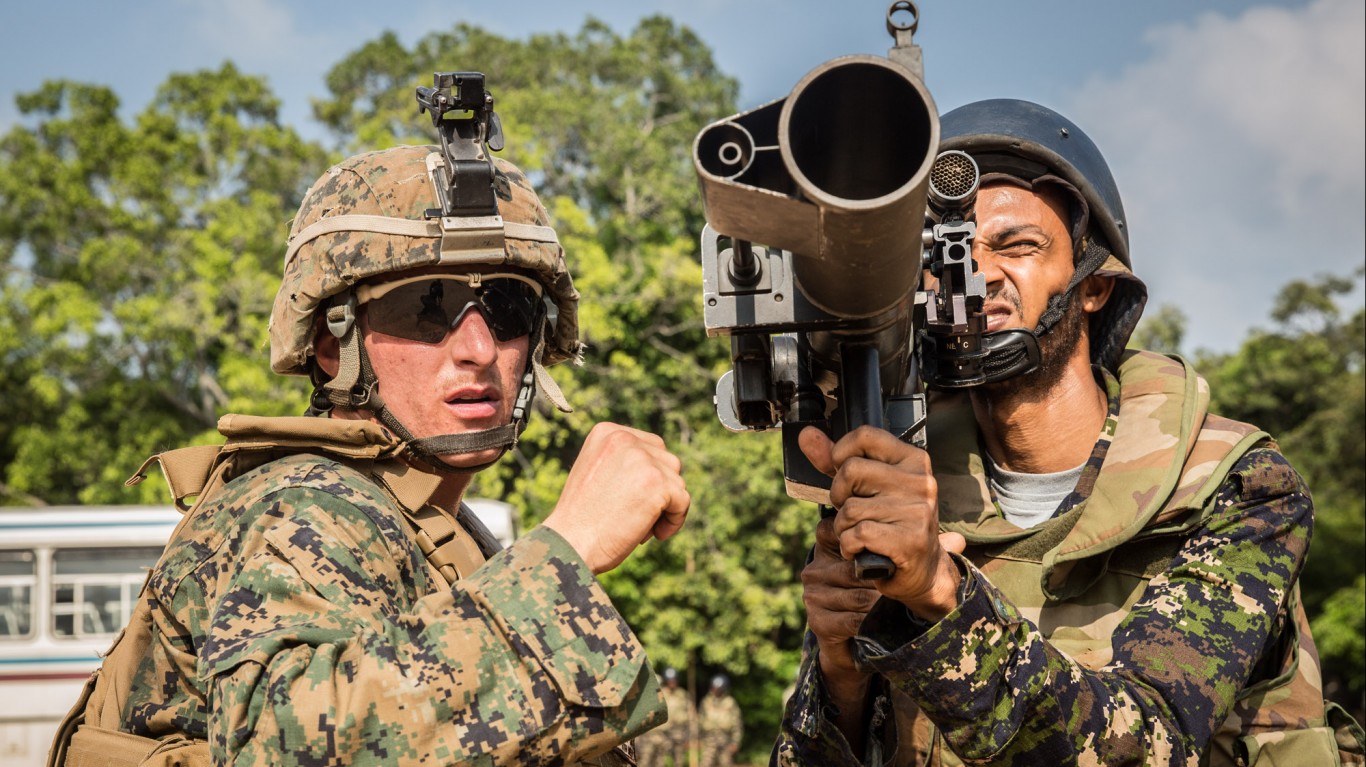
 24/7 Wall St.
24/7 Wall St.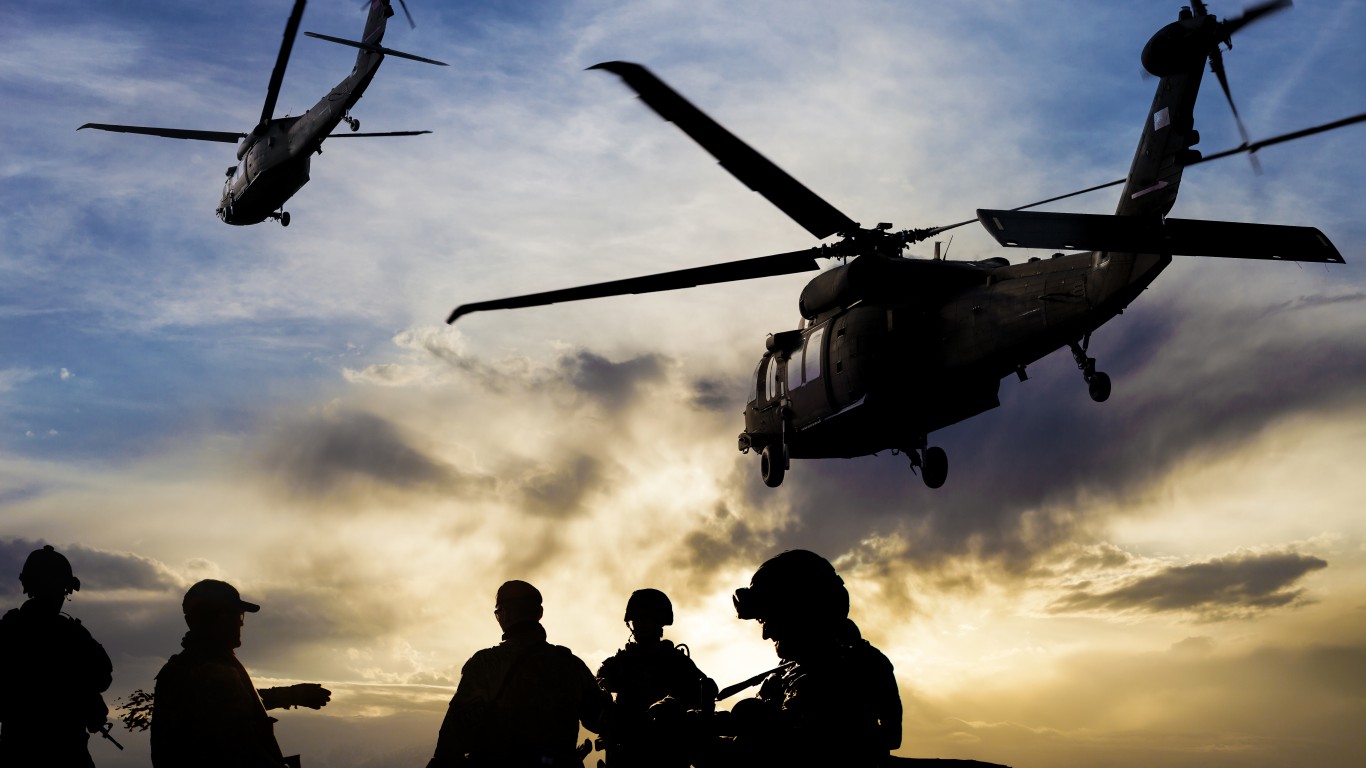 24/7 Wall St.
24/7 Wall St.
